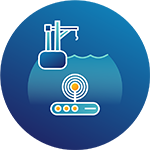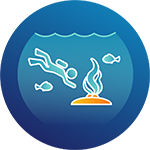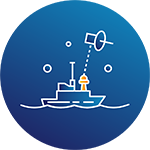
Marine Conservation
Preserving our Greatest Resource
Marine conservation is the protection of marine species and ecosystems in oceans and seas. And while the definition of marine conservation is fairly straightforward, the field of marine conservation is as vast as the ocean itself. Marine conservation ranges from establishing national marine protected areas and the restoration of coral reefs to local beach cleanup days and letter-writing campaigns. It is the subject of international treaties protecting the high seas and individual town ordinances banning single-use plastic. It encompasses an extensive array of scientific, economic, policy and planning disciplines. It is so far-reaching that Greenpeace activists confronting whaling ships and tropical island resort guests spending an afternoon tagging sea turtles can both call themselves marine conservationists.
Health and Well-Being
So clearly, the field of marine conservation does indeed cast a wide net. And for a good reason. Whether we live near the coast or far from the ocean’s shores, the ocean impacts the health and well-being of every one of us. If you have any doubt as to the ocean’s importance to our lives, consider these facts:
- The ocean generates over half the oxygen we breathe. [1]
- The ocean is the largest biosphere on Earth. [2]
- The ocean contains 97% of Earth’s water. [3]
- The ocean is home to 50 – 80% of all life on Earth. [4]
- The ocean plays a crucial role in regulating our climate and weather. [5]
- The ocean provides nearly 3 billion people with their primary source of protein. [6]
Economic Impact
The ocean also has an enormous impact on both the U.S. domestic and global economies. While the value of the ocean and its resources is incalculable, snapshots of different areas of the ocean economy show that:
- Over 3 billion people’s livelihoods depend directly on coastal and marine ecosystems. [7]
- The market value of ocean resources and industries is estimated at $3 trillion per year or about 5 percent of global GDP. [8]
- Marine fisheries directly or indirectly employ over 200 million people. [9]
- About 80% of all tourism takes place in coastal areas. [10]
- 90% of international freight involves marine transport [11]
An Ocean at Risk
But with less than 3% of the ocean protected, the ocean is at risk. As our founder said in her welcoming message: “It’s no secret that the ocean is under tremendous threat. It has never been hotter or more acidic. It’s losing oxygen at an alarming rate. And pollution, especially plastic waste, is negatively impacting almost every aspect of marine life.” Specifically:
- By 2050 there will be more plastic than fish in the ocean. [12]
- The ocean has absorbed over 90% of the excess heat trapped by man-made greenhouse gases. [13]
- Ocean heat is now at record levels, causing widespread marine heatwaves. [14]
- The sea level has risen over 8 inches since 1880 (with about 3 of those inches gained in the last 25 years). [15]
- Every year, an estimated 5 to 12 million metric tons of plastic enter the ocean. [16]
- The ocean has become more acidic due to the absorption of increased levels of atmospheric carbon dioxide. [17]
- Global fish stocks are being depleted and marine life is decimated by overfishing. [18]
The unique thing about marine conservation is that you don’t need a degree, have to belong to an organization, or even possess any specialized knowledge to make a difference. We can all drive less or eat sustainable seafood or stop using single-use plastic. But if you do want to get a degree in marine conservation or join an organization, or gain that specialized knowledge, there are certainly ample opportunities for you to do so.
…
Citations
- Why should we care about the ocean?, National Ocean Service, NOAA.
- About the Ocean, World Resources Institute.
- Life Below Water, United Nations Sustainable Development Goals.
- About the Ocean, World Resources Institute.
- Why should we care about the ocean?, National Ocean Service, NOAA.
- Sustainable Seafood, World Wildlife Fund.
- Life Below Water, United Nations Sustainable Development Goals.
- Life Below Water, United Nations Sustainable Development Goals.
- Life Below Water, United Nations Sustainable Development Goals.
- Why should we care about the ocean?, National Ocean Service, NOAA.
- The Ocean Economy in 2030, Organisation for Economic Co-operation and Development.
- Will the ocean really be dead in 50 years?, The Natural History Museum, London
- Why the Ocean is Everybody’s Business, Ocean Unite.
- Climate Change Indicators: Oceans, U.S. Environmental Protection Agency.
- Sea Level Rise Explained, National Geographic
- Life Below Water, United Nations Sustainable Development Goals.
- Climate Change Indicators: Oceans, U.S. Environmental Protection Agency.
- The sea is running out of fish, despite nations’ pledges to stop it, Woody, Todd, National Geographic (2019).

The Path to Becoming a Marine Conservationist
From High School to Your First Job
Build a Solid Academic Foundation
Basics:
Take all available STEM-related classes (biology, physics, chemistry, computer science, mathematics) and government/policy-related classes offered at your high school. Take all kinds of writing classes (fiction, nonfiction, and even poetry). This will help you build your knowledge and learn how to express that knowledge.
Recommended:
If not available at your high school, try and take biology-related (zoology, biochemistry, microbiology, evolutionary biology, genomics, molecular biology, ecology), ocean-related (marine biology, marine microbiology, oceanography, coastal oceanography), and conservation/sustainability-related classes offered online.
Keep in Mind:
Learn how to write for a scientific and non-scientific audience. The ability to communicate in writing cannot be overstated. Take public speaking classes. Join your school’s debate or Model UN team. While having a scientific background is not the only way to secure a marine conservation career, it will certainly help.
Dive In!
And become an expert
![]()
Peruse our library of must-read books
![]()
Thumb through a relevant publication
![]()
Take an online course
![]()
Watch an interesting video
![]()
Check out these great websites
Get a

jump on your Academic career
There’s no substitute for experience.
We have compiled a database of thousands of internships, research opportunities, academic programs and specialized training programs so you can get a jump on your academic career.
Internships
Research
Academic Training Programs
And if you need support to fulfill your dreams and ambitions, our searchable database has plenty of scholarship opportunities as well as programs designed to increase diversity.
Scholarships
Diversity, Equity & Inclusion
Need Help Finding Your Opportunity?
Our video tutorials explain the ins and outs of landing a great internship, research project or training program.
Make all the right moves
Advice from those who know
Gain experience through internships and volunteering
Obtain a degree in a marine science
Have some work experience on your resume
Develop excellent public speaking and written communication skills
Obtain your scientific diving certification
Learn boating safety and first aid
Join professional societies and organizations
Stay current by reading industry and professional journals
Learn about current research projects
What degree is right for you?

Undergraduate
While a degree is not required for engaging in marine conservation, obtaining your degree will give you a much greater chance of securing paid employment. You can go the science route or the law/policy route or perhaps even pursue both. But even if you opt for a non-scientific career path, some familiarity with the science of marine conservation, marine biology, oceanography, or any other marine science is advisable.
Graduate
If you are pursuing the scientific aspects of marine conservation, a master’s degree will open up more employment opportunities in all sectors. A doctoral degree is required for a career in academia as well as for senior positions in either the government or private sectors. Law school or a graduate school program in government studies is essential for advancement in the non-scientific areas of marine conservation.
10 Schools With Excellent Marine Conservation Programs
Want to see the full list of colleges and universities with degree offerings or relevant courses?
Marine Biodiversity and Conservation (Masters)
University of California, San Diego
Marine Science
California State University, Moss Landing Marine Laboratories
Marine Biology
Hopkins Marine Station, Stanford University
Marine Science & Conservation
Duke University
Marine Conservation Degree Track (Masters)
University of Miami
Marine Biology – Marine Conservation Option
University of North Carolina, Wilmington
Tropical Conservation Biology and Environmental Science (Masters)
University of Hawai’i, Hilo
Biology, Ecology and Conservation Track
Bryant College
Marine Conservation and Management – Hybrid Minor
Oregon State University
Marine Conservation And Resource Management (Masters)
University of South Alabama
![]()
Tip 1
There are just not that many schools with ocean conservation majors. Finding a school with a marine biology or oceanography program will be much easier and provide you with a solid foundation for a career in ocean conservation.
![]()
Tip 2
Start by thinking local – beach cleanups, charities, non-governmental organizations. Take part in every opportunity your school offers, go on field trips, and assist graduate students with their research projects.
![]()
Tip 3
You need to learn how to network. Internships and volunteering are excellent ways to create connections with potential employers, evidence your unique set of skills, and show off your commitment to conservation.
Have familiarity with one or more of the following areas

Scientific communication

Big data

Marine field data collection and analysis

Animal husbandry

Marine Geographic Information Systems

Computer modeling

Ocean law and governance

Business and economics

Scientific diving

Ship navigation and safety
Typical Job Functions of a Marine Conservationist
Here are some of the interesting things you could be doing.
Coordinating educational and outreach programs.
Helping draft new marine conservation legislation.
Supporting conservation and restoration of marine sanctuaries.
Engaging in the protection of endangered species.
Negotiating international treaties governing the use of marine resources.
Drafting and presenting government policy papers.
Planning and managing marine conservation activities.
Establishing programs for ecotourism.
Providing guidance for fisheries management, coral restoration, and habitat protection.
There’s an Ocean of Possibilities
For anyone concerned with the health and well-being of the ocean, marine conservation is an excellent career choice. However, a fair question to ask is what exactly constitutes a marine conservation job? A good rule of thumb is that it is a marine conservation job if the position aids marine conservation efforts.
Common employers include:
Federal Government Agencies
- U.S. Environmental Protection Agency
- National Oceanic and Atmospheric Administration
- National Science Foundation
- U.S. Park Service
- Natural Resources Conservation Service
- Bureau of Ocean Energy Management
State Government Agencies
- Environmental Protection
- Fish and Wildlife
Military
- U.S. Navy
- U.S. Coast Guard
- National Defense Research
Private Industry
- Aquaculture
- Fisheries
- Aquariums
- Zoos
- Wildlife Sanctuaries
- Aquatic Preserves
- Biotechnology
- Environmental Consulting
- Offshore Renewable Energy
- Private Laboratories
- Ecotourism
Non-Governmental Organizations
- Environmental Organizations
- Charitable Organizations
- Conservation Organizations
Academia
- Universities
- Research Institutions
Start your career search with our extensive list of employment websites.
